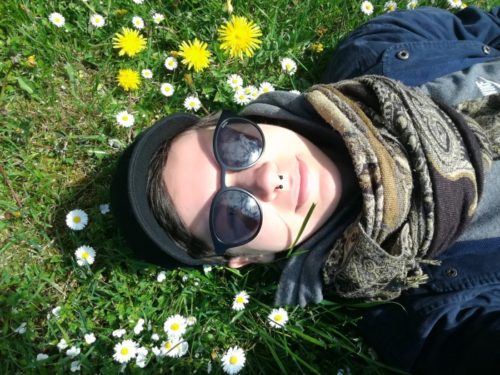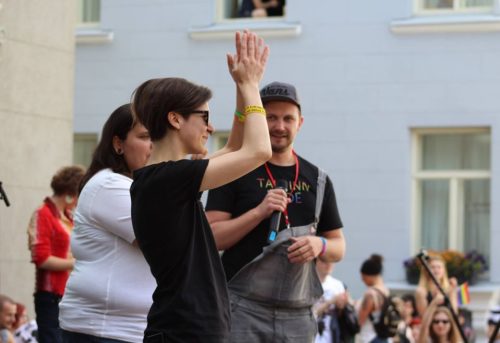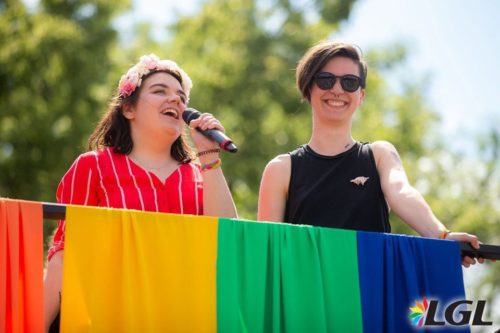Do you know who are the second biggest language relatives of us, Hungarians? The Estonians. We are from the same language family, yet we know much less about them than our most well-known sisters, the Finnish. Let us explore Estonia, and its capital, Tallinn, with the help of Kristiina, one of the leaders of the Estonian LGBT Association.
Can you introduce yourself please, Kristiina?
I was born and live in Estonia, where I work as the Head of Communication at the Estonian LGBT Association, the only comprehensive LGBT+ advocacy organization in the country. A lot of my time and my energy is devoted to LGBT+ and queer issues. I started out as a volunteer in the community and I am lucky enough that now I can do this work as a full-time job. Other than the queer stuff, I am also in love with nature and the outdoors, prefering to spend my days off hiking, biking, and camping. For me, nature is the place where I feel like my most authentic self, where I don't need to explicitly think about my identity, but where I feel my identity - or even identities - at their fullest.

I can totally empathize with that feeling and your love for the outdoors. Now tell us about Estonia. We tend to know too little about your country.
Estonia is a country where the LGBT+ situation is not so bad that we should call it critical. However, it is not good enough either so we could say it is fine. While our country is striving to be like the neighbouring Nordics in some aspects, we are still very much influenced by our Eastern European and post-Soviet heritage. This means that misinformation on LGBT+ topics is widespread; we are facing the same far-right tendencies as other countries with similar pasts. In addition, Estonians on the whole are rather surviving than thriving, which is hindering us from being open to a diversity of experiences and expressions.
Although we are hailed as the first post-Soviet country to legalise the registration of same-sex relationships, it is not quite as simple and rosy as that. We do have a gender neutral cohabitation law since 2014, but the parliament has not passed the implementation act accompanying it, meaning the law only really exists on paper and is not fully functional. This means that people have had to turn to court to use the rights the state has promised to respect.

Estonia is a relatively small country. Would you say that the LGBT situation is the same everywhere?
No, because social attitudes vary according to your location, social circles, and background. The larger cities tend to be more open or at least nonchalant on LGBT+ issues, while smaller places, of which we have many, and majority Russian-speaking areas (influenced more by Russia) tend to be more conservative and biased.
Where do you live within Estonia? What’s the situation in your city?
I live in Tallinn, the capital city, and in that I am lucky. There is quite a lot of LGBT+ or LGBT-friendly nightlife happening, our organization is based here, you probably have the best chances of finding a friend group and acquaintances, two universities here have LGBT+ groups, Pride and other festivals take place here. There are things happening elsewhere as well, but events and contacts tend to concentrate in Tallinn. Nevertheless, a lot of people still do not feel entirely comfortable being explicitly visible in the streets, schools, and workplaces, because you never know how someone might react.
The good thing about Estonians is that we really value our private space, so invading someone else's space with harassment would also bring yourself out of your comfort zone, but it does not stop the worry or fear of LGBT+ people who are constantly being reminded by politicians and certain groups that they are not welcome and could be in danger. Verbal and physical attacks do happen, but we do not have a clear overview of hate incidents, because people do not want to report. Hate crimes and hate speech is not properly regulated either, so LGBT+ people who face a form of hate every day, feel like no one would protect them anyway.

Finally, can you share a memorable coming out story of yours?
I am a bit of a special case in terms of coming out, and I say that with full respect and humility towards all LGBT+ people who have ever had to come out or just think about it. I did not technically come out, I guess. I was straight until the age of 24, and then I wasn't. I met a woman, immediately had a crush on her, we fell in love, and I was very happy. I told all my friends and anyone who would listen how in love I was, not how queer I was. And everyone accepted it. As I was already an independent adult, I had surrounded myself with people who I felt comfortable with. I was also lucky enough to have accepting parents. My mom was surprised when I said I was in love with a "she", not a "he", but that was pretty much it. She has accepted all my partners ever since, even becoming friends with them. My dad also asked a couple of "really?" questions, but that was it. My grandma keeps saying how good of a person my current girlfriend is and how lucky we are that we found each other. I'm lucky all around, and I appreciate it all the more because, working with our community, I know how difficult this can be. On the other hand, for anyone who has a chance of being accepted like this, I would definitely recommend staying true to yourself. Being visibly happy can make it pretty hard for your loved ones not to be happy for you.

